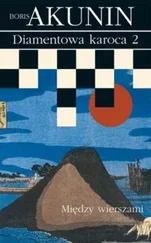A man in a check cap came flying out of the door with his head pulled down into his shoulders. Masa caught the fugitive with an uppercut and laid him out with a blow to the nape of the neck. He rapidly tied him up and dragged him over to the carriages, where the driver Fandorin had half throttled was lying.
Soon another one jumped out through the window and took to his heels without looking back. The Japanese easily overtook him, grabbed him by the wrist and twisted it gently. The bandit squealed and hunched over in pain.
‘Easy, easy,’ Masa coaxed his prisoner as he quickly tied his wrists to his ankles with his belt.
He carried him over to the other two and went back to his original position.
There was no more noise from inside the shop. Masa heard Fandorin’s voice.
‘One, two, three, four … where’s number five? Ah, there he is – five. Masa, how many have you got?’
‘Three.’
‘That tallies.’
Erast Petrovich thrust his head out through the rectangle rimmed with barbs of glass.
‘Run to the depot and bring the gendarmes. And quick about it, or this lot will come round and we’ll be off again.’
The servant ran off in the direction of Novo-Basmannaya Street.
Fandorin untied the watchman and gave him a few slaps on the cheeks to bring him to his senses. But the watchman didn’t want to come to his senses – he muttered and screwed up his eyes, quivered and hiccupped. In medical terms it was called ‘shock’.
While Erast Petrovich was rubbing his temples and feeling for a nerve point just below his collarbone, the stunned bandits began to stir.
One muscly hulk, who had taken an impeccable blow to the chin from a shoe only five minutes earlier, sat up on the floor and started shaking his head. Fandorin had to leave the hiccupping watchman in order to give the reanimated bandit a second helping.
No sooner had that one dived nose first into the floor than another one came round, got up on all fours and started crawling nimbly towards the door. Erast Petrovich dashed after him and stunned him.
A third one was already stirring in the corner, and things were also getting confused out on the street, where Masa had arranged his bandit ikebana: by the light of the street lamp Fandorin could see the driver trying to unfasten the knot on one of his partner’s elbows with his teeth. It occurred to Fandorin that now he was like a clown in a circus who has thrown several balls up in the air and doesn’t know how he’s going to deal with them all. While he’s picking one up off the floor, the others come showering down.
He dashed to the corner. A dark-haired bandit (could it be Yuzek himself?) had not only come round, he had already managed to take out a knife. A quick blow, and another one to make sure. The bandit lay down.
Then a rapid dash to the carriages – before those three could crawl away.
Damn it, where had Masa got to?
But Fandorin’s valet had not managed to reach Lieutenant Colonel Danilov, who was hanging about cluelessly with his men at the Varvarin Company building.
At the very first corner an agile fellow flung himself under Masa’s feet and another two fell on him from above, twisting his arms behind his back.
Masa growled and even tried to bite, but they had his arms twisted tightly, in true professional style.
‘Evstratii Pavlovich! We’ve got one! A Chink! Tell us, Chinky, where’s the shooting?’
They pulled Masa’s pigtail and the wig flew off his head.
‘He’s in disguise!’ the same voice shouted triumphantly. ‘But he’s a slanty-eyed git all right, a Jap! A spy, Evstratii Pavlovich!’
Another man, wearing a bowler hat, walked up and praised his men.
‘Good lads.’
He leaned down to Masa.
‘Good evening to you, Your Japanese Honour. I’m Court Counsellor Mylnikov, Special Section, Department of Police. What’s your name and rank?’
The prisoner tried to give the court counsellor a vicious kick on the shin, but he missed. Then he started hissing and cursing in some foreign tongue.
‘No point in swearing,’ Evstratii Pavlovich rebuked him. ‘You’re caught now, so you can stop chirping. You must be an officer of the Japanese general staff, a nobleman? I’m a nobleman too. So let’s deal honestly with each other. What were you up to here? What’s all this shooting and running about? Give me a light here, Kasatkin.’
The yellow circle of electric light picked out a narrow-eyed face contorted in fury and a head of short-cropped, shiny black hair.
Mylnikov started babbling in confusion:
‘Why, it’s … How do you do, Mr Masa …’
‘Rong time, no see,’ hissed Fandorin’s valet.
The third syllable, in which Rybnikov gets into a jam
In recent months Vasilii Alexandrovich Rybnikov (now Sten) had lived a feverish, nervous life, dealing with hundreds of different matters every day and getting no more than two hours’ sleep a night (which, however, was quite enough for him – he always woke as fresh as a daisy). But the telegram of congratulations he had received the morning after the crash at the Tezoimenitsky Bridge had relieved the former staff captain of routine work, allowing him to concentrate completely on his two main missions or, as he thought of them, ‘projects’.
The brand-new Reuters correspondent did everything that needed to be done at the preliminary stage in the first two days.
In preparation for the main ‘project’ (this involved the onward delivery of a large consignment of certain goods), it was sufficient to send the consignee with the frivolous name of Thrush a letter by the municipal post, telling him to expect delivery in one or two weeks, everything else as formerly agreed.
The second ‘project’, which was of secondary importance, but even so very significant indeed, also required very little fuss or bother. In addition to the aforementioned telegrams to Samara and Krasnoyarsk, Vasilii Alexandrovich ordered from a glass-blowing workshop two slim spirals to match a drawing that he supplied, whispering confidentially to the receiving clerk that they were parts of an alcohol purification device for home use.
By inertia or as a pendant, so to speak, to his hectic life in Peter, Rybnikov spent another day or two running round the military institutions of Moscow, where a correspondent’s calling card ensured him access to all sorts of well-informed individuals – everyone knows how we love the foreign press. The self-styled reporter discovered a great deal of curious and even semi-confidential information, which, when properly assembled and analysed, became completely confidential. After that, however, Rybnikov thought better of it and put an end to all his interviewing. In comparison with the projects that he had been charged to carry out, this was petty business, and there was no point in taking any risks for it.
With an effort of will, Vasilii Alexandrovich suppressed the itch for action that had been developed by long habit and forced himself to spend more time at home. Patience and the need to remain in a state of quiescence are a severe trial for a man who is not used to sitting still for a single minute, but even here Rybnikov proved up to the challenge.
He transformed himself in an instant from an energetic, active individual into a sybarite who sat in his armchair at the window for hours at a stretch and strolled around his apartment in a dressing gown. The new rhythm of his life coincided perfectly with the regimen of the carefree inhabitants of ‘Saint-Saëns’, who woke up at about midday and strolled round the house in curlers and carpet slippers until seven in the evening.
Vasilii Alexandrovich established a wonderful relationship with the girls in no time at all. On the first day the young ladies were still uncertain of the new boarder, and so they made eyes at him, but very soon the rumour spread that he was Beatrice’s sweetheart , and the tentative romantic approaches ceased immediately. On the second day ‘Vasenka’ had already become a general favourite. He treated the girls to sweets and listened to their tittle-tattle with interest and, in addition to that, he tinkled on the piano, crooning sentimental romances in a pleasant, slightly mawkish tenor.
Читать дальше









